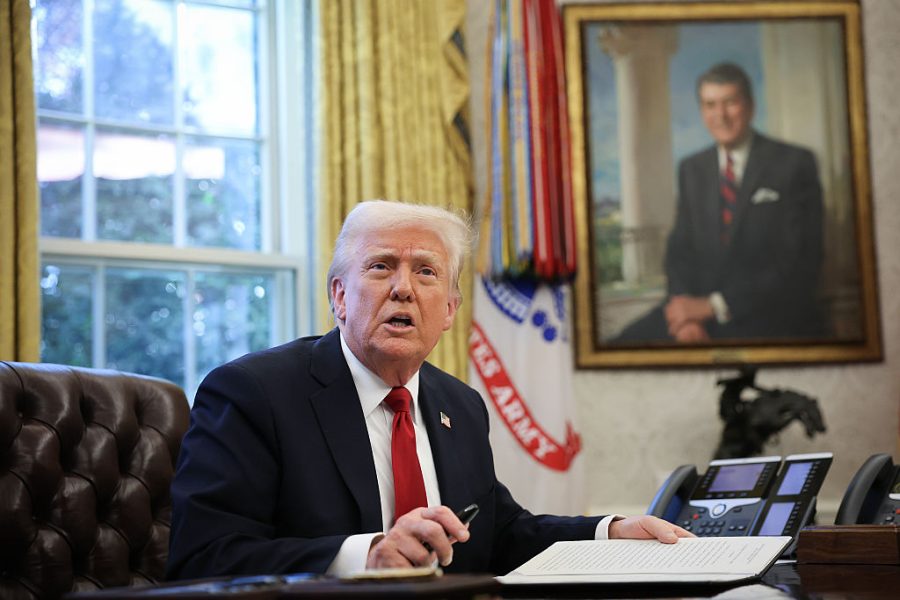The Nato secretary general, Mark Rutte, has warned Russia that the alliance would defend Poland against any aggression and would do so without restraint. On a visit to Warsaw, he said:
When it comes to the defence of Poland and the general defence of Nato territory, if anyone were to miscalculate and think they can get away with an attack on Poland or any other ally, they will be met with the full force of this fierce alliance. Our reaction will be devastating. This must be clear to Vladimir Vladimirovich Putin and anyone else who wants to attack us.
Would Nato’s ‘full force’ be brought to bear against Russia if it infringed Poland’s sovereignty?
A full-scale Russian invasion of Poland, comparable to the strike against Ukraine which began in 2022, may not be imminent. Nevertheless, the Poles can be forgiven for regarding their eastern neighbour-but-one uneasily. Their country disappeared from the map between 1795 and 1918, largely absorbed by Russia, before it fought a two-year war against the Soviet Union in 1919-21 and was invaded from the east in 1939 when Nazi Germany struck from the west. Poland was then a Soviet satellite from 1947 to 1989.
Is Rutte’s defiance justified? Given the radical and very public shift of American priorities away from European security over the last two months, would Nato’s ‘full force’ be brought to bear against Russia if it infringed Poland’s sovereignty? After all, the drums in Washington have sounded an insistent tattoo: Europe must step up and take responsibility for its own defence, and the days of ‘freeloading’ and reliance on the military strength of the United States are over. The lurid machismo earlier this week of the leaked Signal group chat involving many of the Trump administration’s senior figures spelt this out for anyone who had not been paying attention.
Responding to Rutte’s remarks, the Polish prime minister Donald Tusk said, ‘it’s very important for us, the commitment that Nato will defend Poland in any critical situation.’ His country now spends more of its GDP on defence than any other member of the alliance, at 4.7 per cent, but the fact remains that Poland is a country of fewer than 40 million souls – a quarter of Russia’s population and smaller than that of Ukraine before the outflux which followed the Russian invasion three years ago. Rutte responded that the relationship between the United States and Europe is ‘the pillar of our alliance and that’s not changing’.
Is that a confident prediction or a heartfelt hope? I am no longer sure that the United States would come to the assistance of Poland in the way we would have taken for granted a decade ago. Optimists point to Article 5 of the North Atlantic Treaty which enshrines the concept of collective security within Nato. Even assuming that President Trump felt any obligation to honour the terms of the treaty – a stretch in itself – the wording of Article 5 is not as binding as some imagine.
In the event of an attack on a member of Nato, each of the other members is required to take ‘such action as it deems necessary, including the use of armed force, to restore and maintain the security of the North Atlantic area’. Deciding what is ‘necessary’ is left to individual members.
More alarming than the prospect of a legalistic search for loopholes, however, is the possibility that the Trump administration would simply not see defending Poland either as being in the US national interest or as a moral imperative. The American attitude emerging from the negotiations with Russia over Ukraine in recent weeks has consistently shown an antipathy towards Ukrainian President Volodymyr Zelenskyy and an indulgent latitude towards the Russian perspective.
In his recent interview with the Kremlin-admiring Tucker Carlson, Trump’s special envoy and negotiator of choice property investor Steve Witkoff said he ‘liked’ Vladimir Putin, who was ‘gracious’ and ‘straight-up’. He concluded, ‘I don’t regard Putin as a bad guy. He’s super smart.’
Imagine if Russian forces passed through allied Belarus and crossed into Poland to defend some spurious ‘national interest’. The Poles, rightly, appeal to their Nato allies to resist this invasion, which Putin instead dubs, let us suppose, a ‘special military operation’. The outcome is the same: Russian soldiers are on Polish soil, less than 50 miles from Warsaw.
Can we really be sure that Washington would without hesitation commit even the 100,000 troops of US Europe Command, let alone additional forces? Or would Trump seek some kind of settlement between the parties and abandon America’s commitment to collective security? I can no longer say with confidence it would be the former. Can you?








Comments